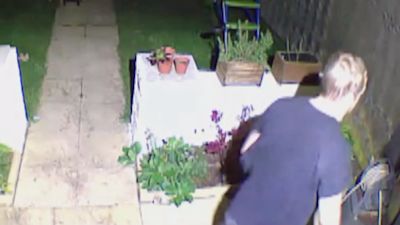Norton Fitzwarren murder trial: Moment ex-soldier climbs over garden fence before killing neighbours

Collin Reeves is filmed entering and leaving his neighbours' back garden on the night of the killings.
This is the moment an ex-soldier entered his neighbours’ back garden before stabbing them to death with a ceremonial dagger while their children slept upstairs.
Footage was played to jurors in the trial of ex-commando Collin Reeves of the seconds before he killed Jennifer and Stephen Chapple on November 21 last year.
Reeves denies murdering the married couple, who were in their 30s, but has admitted manslaughter on the grounds of diminished responsibility.
He claims he was suffering an abnormality of mental functioning when he attacked the Chapples in their home with the dagger he was given when he left the Army.
Jurors at Bristol Crown Court were told the neighbours, who lived in Dragon Rise, Norton Fitzwarren, near Taunton in Somerset, had been involved in a long-running dispute over designated parking on the new-build housing development.
Two separate clashes were captured on the Chapples’ doorbell cam and played in court earlier, with Reeves seen confronting Mrs Chapple over a space outside their home.
During the second incident, which happened just 10 days before the killings, Reeves, 35, could be heard calling Mrs Chapple a “f****** c***” and “you fat b****”.
Mrs Chapple appears to look at him and say: “You’re the one who started it… so f*** off” before entering her home and slamming the front door.
During another run-in on May 15, Reeves approaches Mrs Chapple in her car and tells her “you can’t park here” as she positions herself near a gravelled area outside his home.
“You don’t own the road,” Mrs Chapple tells him, before he moves around to the front of the vehicle and continues confronting her.
Jurors also heard a recording of the ex-soldier detailing the stabbings to a 999 operator minutes after killing the married couple.
When officers arrived at the scene, the couple’s children were still asleep upstairs.
While in custody after his arrest, Reeves claimed he had been struggling with his mental health since returning from Afghanistan, where he served in the Army until 2009, jurors heard.
He said he had “traumatic” experiences in Afghanistan coming “face to face with terror” and had tried to block out some of his memories, the court heard.
But mental health teams assessing him while he was detained found no signs of thought disorders, paranoia or psychosis, jurors were told.
He appeared “upset and tearful at times, in what appeared to be an appropriate response to his situation”, one team reported.
The trial, which is expected to last eight days, continues.